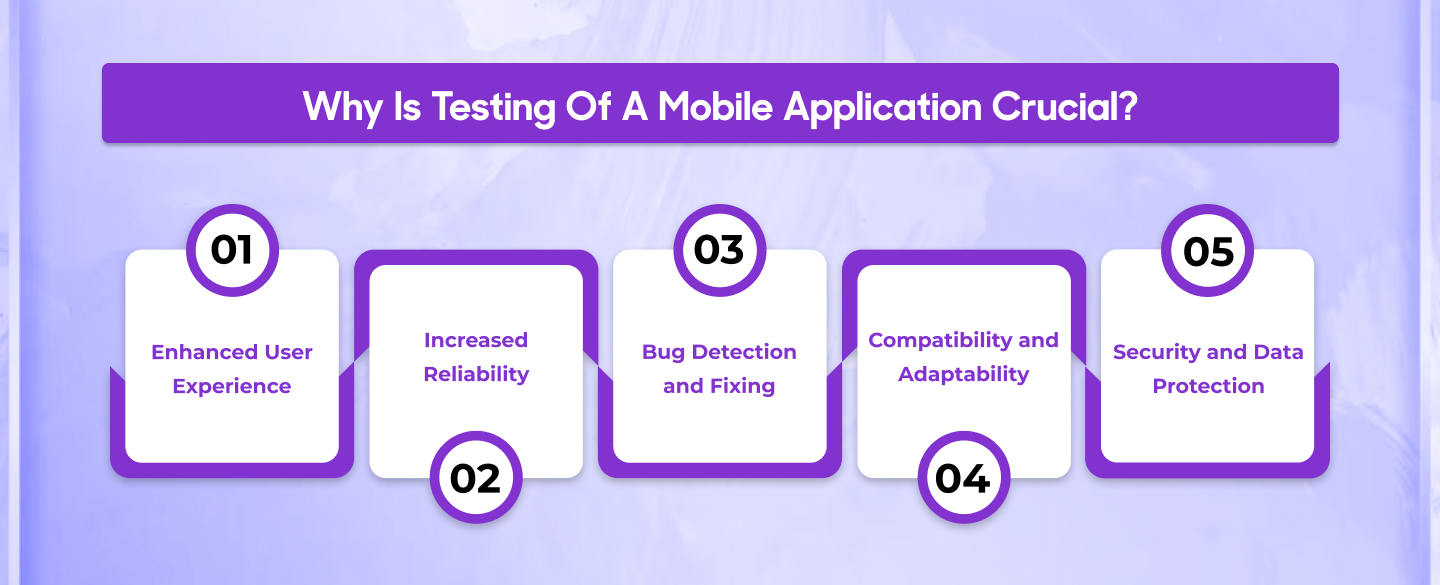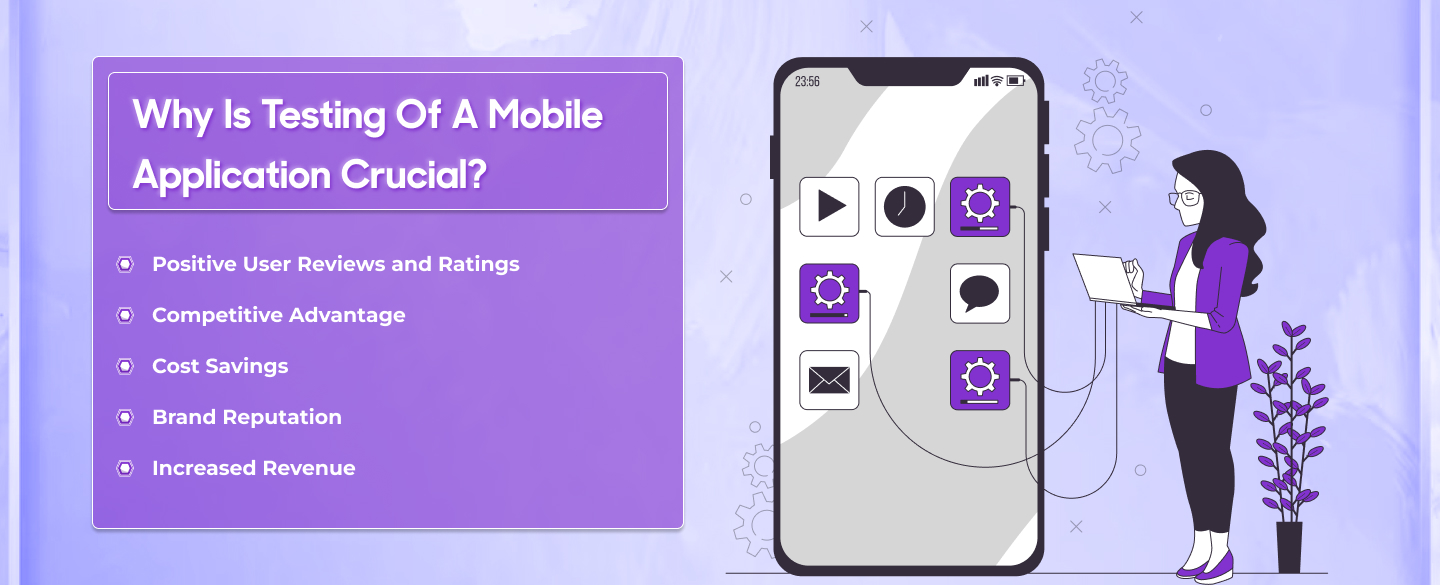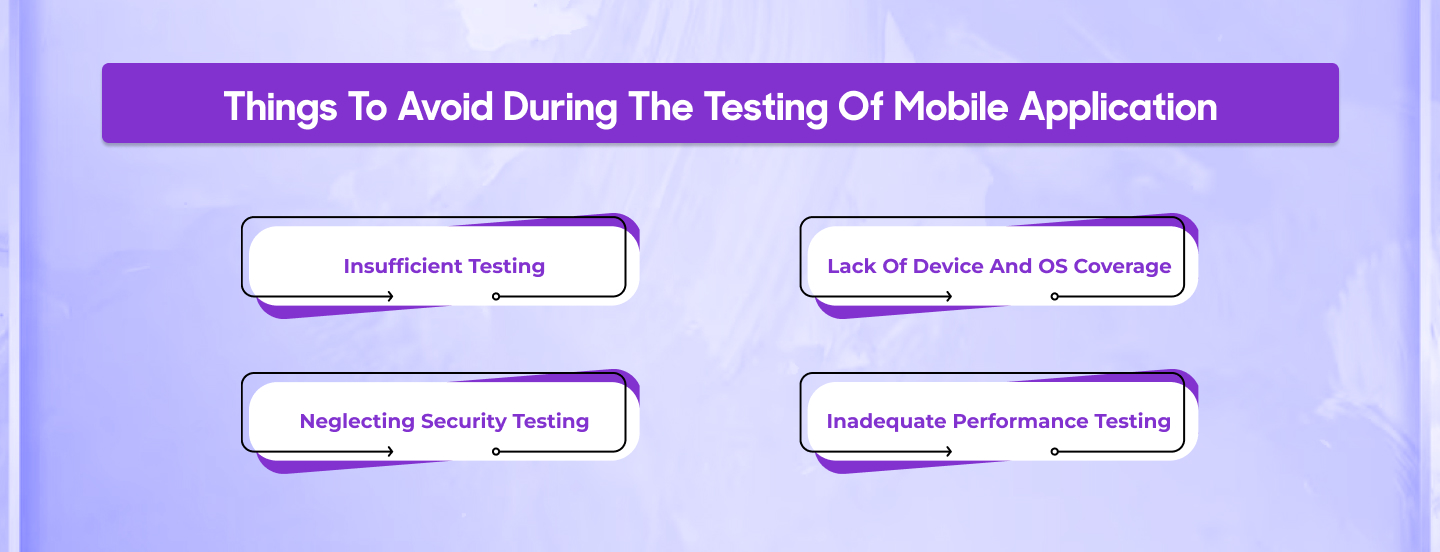Mobile App Testing refers to the process of evaluating the functionality, usability, performance, and security of a mobile application before it is released to the market. It involves testing the application on various devices, operating systems, networks, and user scenarios to ensure that it works as intended and provides a seamless user experience.

Key Types of Mobile App Testing Highlighting App Testing Importance:
1. Functional Testing:
This involves testing the core functionality of the app to ensure that all features work as expected and meet the requirements.
2. Usability Testing:
It focuses on evaluating the user interface, user experience, and ease of navigation to ensure that the app is user-friendly and intuitive.
3. Performance Testing:
This type of testing assesses the speed, responsiveness, and stability of the app under various load conditions, such as high user traffic or limited network connectivity.
4. Security Testing:
It involves checking for vulnerabilities and weaknesses in the app’s code, data storage, and communication channels to ensure that sensitive user data is protected.
5. Compatibility Testing:
This testing ensures that the app works seamlessly on different devices, screen sizes, operating systems, and versions.
6. Localization Testing:
It checks the app’s compatibility with different languages, cultural nuances, and regional preferences to ensure a localized user experience.
7. Regression Testing:
It involves retesting the app after changes or updates to ensure that new features or bug fixes do not introduce new issues or break existing functionality.

Testing is crucial for the success of a mobile application for the following reasons:
1. Enhanced User Experience:
Understanding app testing importance helps identify and fix bugs, usability issues, and performance bottlenecks, resulting in an improved user experience.
2. Increased Reliability:
Testing helps ensure that the app functions reliably without crashes, freezes, or unexpected behavior, which builds user trust and loyalty.
3. Bug Detection and Fixing:
Testing helps identify and address software defects, ensuring that the app is stable, functional, and free from major issues.
4. Compatibility and Adaptability:
Knowing the app testing importance ensures testing on different devices, operating systems, and network conditions, so the app works well in diverse environments, reaching a broader user base.
5. Security and Data Protection:
Testing helps uncover security vulnerabilities and ensures that the app handles user data securely, protecting against data breaches and privacy violations.
Mobile application testing strategies can vary depending on factors such as project requirements, budget, and time constraints. Some common strategies include manual testing, automated testing, and crowdtesting (involving real users to test the app in real-world scenarios).

Mobile app testing Importance for your business in several ways:
1. Positive User Reviews and Ratings:
A well-tested app leads to satisfied users, positive reviews, and high ratings, boosting the app’s reputation and increasing downloads.
2. Competitive Advantage:
A thoroughly tested app with superior functionality and user experience stands out from the competition, attracting more users and retaining them.
3. Cost Savings:
Identifying and fixing issues during the testing phase is more cost-effective than addressing them after the app’s release, reducing development and maintenance costs.
4. Brand Reputation:
A stable and reliable app enhances your brand reputation, fostering trust and credibility among users.
5. Increased Revenue:
A high-quality app that meets user expectations and performs well is more likely to generate revenue through in-app purchases, subscriptions, or ad placements.

During mobile app testing, understanding app testing importance helps in avoiding common pitfalls, such as:
1. Insufficient Testing:
Testing only in ideal conditions without considering real-world scenarios can lead to overlooked issues and poor app performance.
2. Lack of Device and OS Coverage:
Testing on a limited set of devices or operating systems may result in compatibility issues and a subpar user experience.
3. Neglecting Security Testing:
Overlooking security testing can expose the app and user data to potential vulnerabilities, leading to reputational damage and legal issues.
4. Inadequate Performance Testing:
Failing to test the app’s performance under different loads and network conditions can lead to slow response times, crashes, and dissatisfied users.

In conclusion, mobile app testing is crucial for ensuring the success of your app. It highlights the app testing importance by enhancing user experience, identifying and fixing bugs, improving reliability and security, and ultimately contributing to the app’s reputation, user satisfaction, and business growth.

TABLE OF CONTENT
- What is Mobile App Testing? Why is It Important for Your App’s Success?
- There are several types of testing that are performed during the mobile app testing process:
- Testing is crucial for the success of a mobile application for the following reasons:
- Mobile app testing benefits your business in several ways:
- During mobile app testing, it’s important to avoid common pitfalls, such as:


